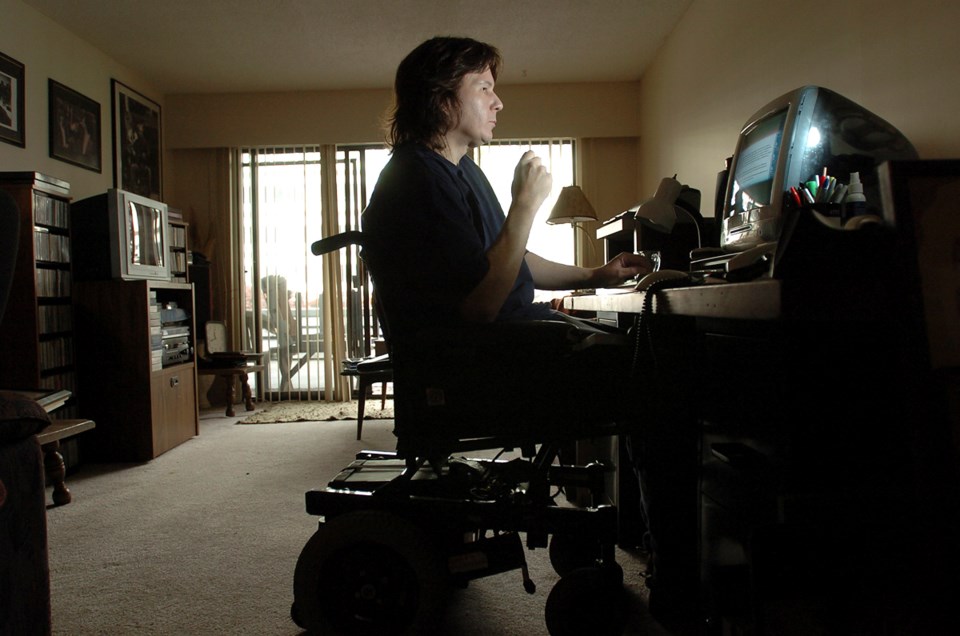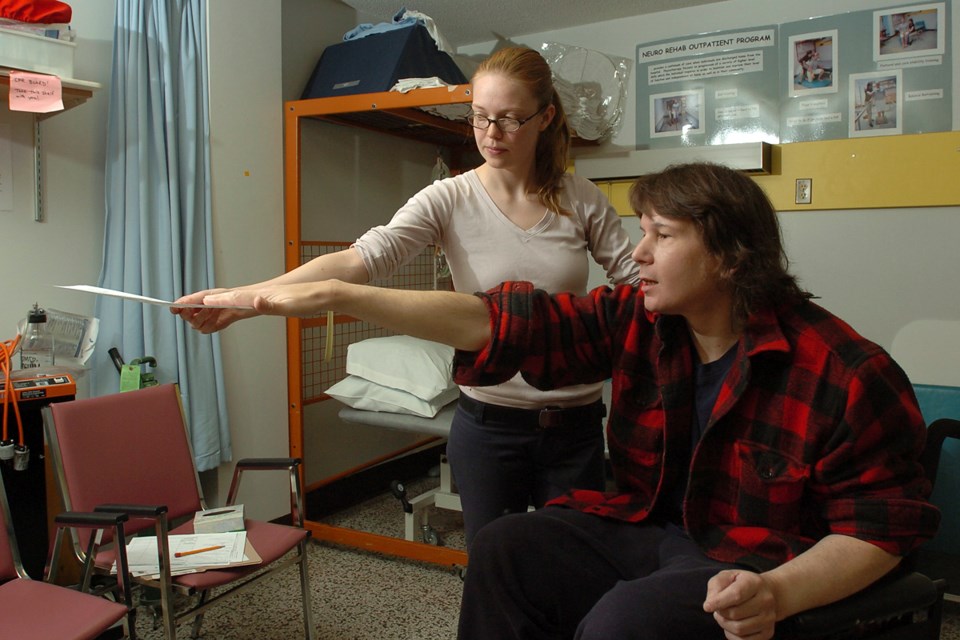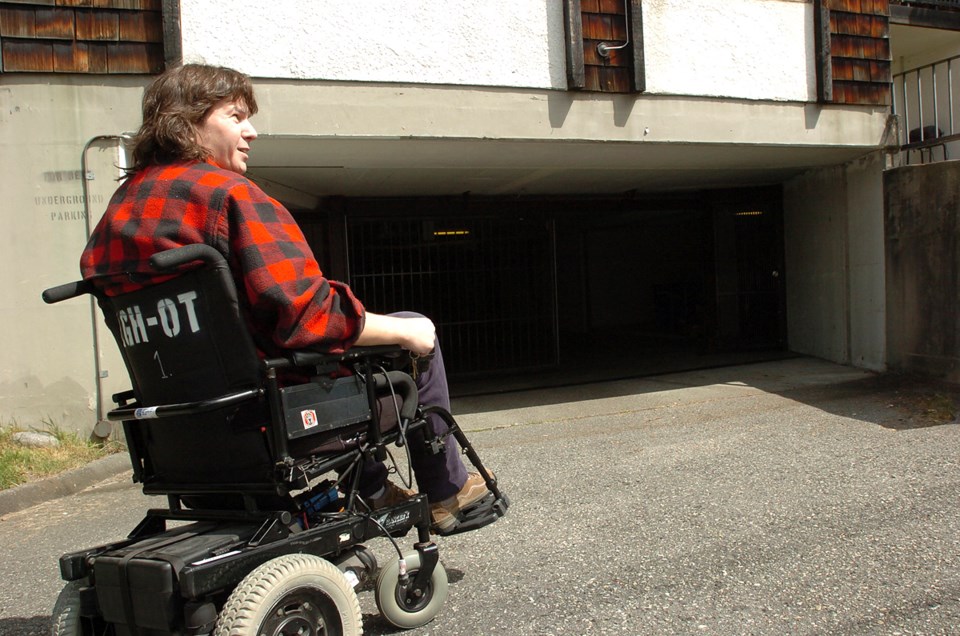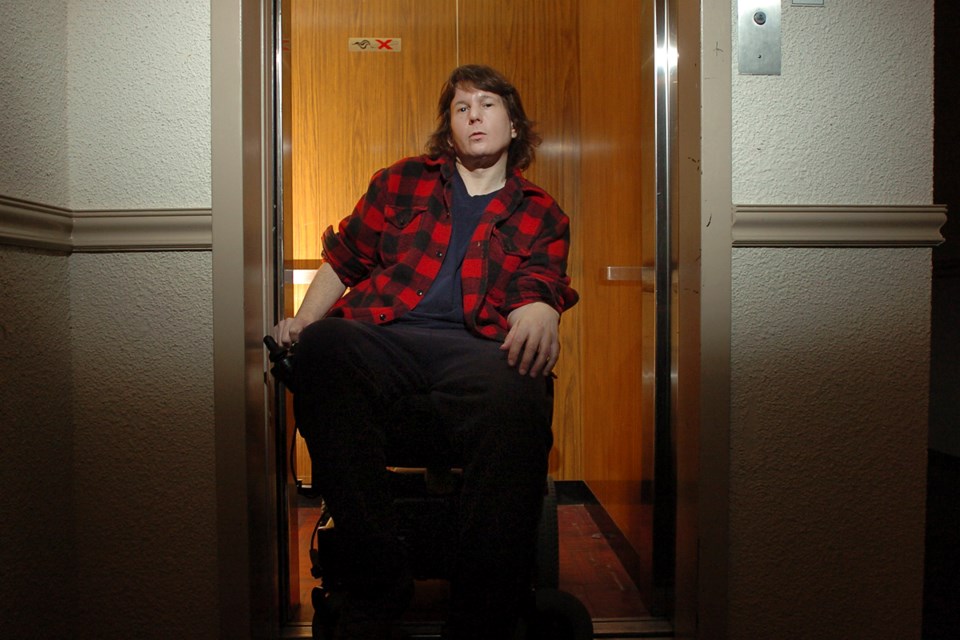Note: Music writer Greg Potter died at age 54 on Sept. 11, 2016. This 2006 Courier cover story about Potter chronicled his health struggles.
At 3:51 a.m. on Tuesday, Jan. 31, Deep Cove Fire Hall No. 4 received a bizarre 911 dispatch call about a man who awoke and found himself unable to move. Like all 911 calls, it came in as an address. The only information the hall received concerned a man who'd awakened around 2 a.m. to use the toilet and discovered he was paralyzed from the chest down.
Lying on his back in the dark bedroom of a North Shore apartment, wedged between the bed and the wall with his legs twisted in the sheets above him on the bed, Greg Potter wondered about the sudden turn his life had taken. The legs that took him on regular hikes along the Baden Powell Trail were out of commission. He had no sensation from the waist down. He couldn't even wiggle his toes.
"Well, this is new," he said quietly to himself.
Other than feeling a little under the weather, Potter had gone to bed after a typical day for a local freelance writer, musician and author who's written for just about every publication in Vancouver, including the Courier. He'd started work on a story about the New York steel-guitar gospel group the Campbell Brothers for the North Shore News, answered emails, made calls and contemplated his next move.

His good friend Les Wiseman, an editor at Canada Wide Communications, had telephoned to offer him work a day or so earlier, but Potter turned it down because he wanted to work on a novel he'd started.
Although he missed his almost daily hike in the trails above Deep Cove, he kept to the Zone diet that had helped him lose a considerable amount of weight off his six-foot, four-inch frame a few years earlier, when he also gave up booze and a more raucous lifestyle.
Potter went to bed at 10 p.m. thinking about giving up his apartment and moving to the Sunshine Coast, where he could easily telecommute for the bulk of his freelancing gigs, travelling into the city when necessary. He didn't pay much attention to the pins and needles sensation in his legs or the minor back pain. He attributed everything to a muscle he'd torn a few days earlier.
Only a week earlier, nearing his 44th birthday, his family physician gave him a clean bill of health. He was happy and had friends. Life was proceeding as normal, and like most healthy people, he was making plans. He didn't know his life was about to change.
"I guess this is my 44th birthday present," he later joked.
Potter knew he had to call someone when his legs refused to move. But because he wasn't yet alarmed about his situation, he called his mother.
"Usually when the phone rings at that time your heart races, but it didn't for some reason," recalls Fran Potter, his 82-year-old mother.
Picking up the phone she heard her son calmly say, "I think I'm paralyzed from the waist down. Do you think I should call an ambulance?'"
"Sounds like a good idea," she replied.
That he was able to call anyone was an accomplishment. The phone was on the other side of his queen size bed and Potter only had one working arm to drag himself along. (He'd wrenched a muscle in his left shoulder, which left that arm useless.) Using his good right arm, Potter clumsily pulled his 210-pound frame across the bed, accidentally knocking over the table in the darkened room and disengaging the phone adaptor from the power bar. Plugging the adaptor back in proved difficult in his physically altered state and he ended up with his back on the floor, shoulder blades pinned to the wall, numb legs on the bed still twisted in bedding. Still, he managed to plug everything back in and punch in his mother's number.
After taking her advice, he dialed 911 then called her back. She stayed on the phone with him until the firefighters and paramedics arrived.
Lying on his bedroom floor in the dark, with books and CDs digging into his back and shoulders, he thought, "I'm at the bottom of the Marianas Trench — there's nowhere to go but up."
It had been a rough couple of years for the Potter family. His older brother Glenn died of a heart attack. Doug, Glenn's twin, faced serious health problems that put him in a coma for a week.
When Wiseman heard the news about his friend, who he met about 20 years ago while writing about his band Lost Durangos for Vancouver Magazine, he was stunned. His heart went out to Potter's mother.
"I was gobsmacked — hearing what happened to him was like a hammer in the forehead," says Wiseman. "Greg had been through a long run of bad luck and hard times and this was just unbelievable. I especially felt for his mother, who had recently lost another of her sons."
Fran Potter, recovering from throat surgery, remembers her youngest of four sons being calm when he called her to tell her about his sudden paralysis.
"He didn't seem to be upset. Maybe he was stunned," she recalls, her voice low and gravelly due to the recent surgery. "It's such a weird thing to wake up paralyzed. Good grief."
Potter says he found his situation oddly humourous. He attributed the paralysis to the pulled muscle or the flu-like feelings he'd been having and thought it would right itself in a day or two.
"Surprisingly, I didn't freak out, even though I didn't feel a thing — literally not a thing — from the chest down," he says. "In retrospect, I don't think it was having to use the can that woke me up — and, no, I didn't make it [to the toilet] — my nerves would have been toasted in that area and I wouldn't have felt a thing."
Although the firefighters arrived within seven minutes of receiving the call, it took them another 20 minutes to get inside Potter's apartment, where they found him jammed between the bed and the bedroom wall. Since Potter couldn't unlock the door, the firefighters had hoisted a ladder up to the second floor to find his balcony. The windows were locked and they didn't want to bust through in case it wasn't his balcony. By this point the RCMP had arrived, allowing the firefighters the legal right to break in through the front door.
Potter greeted one of the first firefighters on the scene.
"Oh, hi Dave," he said
"Hi Greg," said a stunned Capt. David Franco, who knows Potter through his older twin brothers, both of whom were firefighters on the North Shore. He recalls that Potter was apologetic about the call.
"They're all pretty affable guys who don't want to be a problem," he says. "He had that apologetic attitude, which is ridiculous. There were a lot of sorries in there, which the Potters are famous for... but when you realize it's someone you know, and no firefighter waits for that call, it's harder to detach yourself from the job and do what you have to do. It becomes personal all of a sudden."
Getting Potter out of the apartment and into the ambulance took almost an hour. Franco and his crew had to take the bed and a bookshelf apart, disrobe Potter to assess his condition and place him carefully on a stretcher, which took three men. Potter, now almost naked, remained calm — even helpful.
"You usually don't see people this calm and relaxed when they can't feel their legs — they're usually quite agitated," says Franco. "Greg kept his sense of humour throughout the whole thing."
Nobody knew it at the time, but the wiring in Potter's legs — not to mention his groin, bladder and bowels — had been short-circuited due to a spinal cord injury.
Although it was five in the morning and there was no traffic on the roads, the ambulance driver turned on the siren to race to the hospital. The paramedics wanted to avoid any sudden stops to prevent jarring of the spine. It was Potter's second trip in an ambulance — the first he can't recall because he was unconscious after a barroom brawl.
"This time it was kind of fun, in a submoronic little-kid kind of way," he says.
Luckily for Potter the Lions Gate Hospital ER was empty and he was seen immediately — none too soon. While undergoing a barrage of questions about his health, lifestyle, dental work, recent cuts, bruises, bites and MRIs, and more questioning from an infectious disease specialist, Potter developed a high fever. The time he spent awaiting test results in the ER doped up on drugs is a blank except for a neurologist's comment: "This is significant."
"I'm sure I asked a lot of dopey questions, but that is the one response I clearly recall. 'This is significant.' I didn't say anything but thought to myself, 'What the f*** does that mean?'"
By noon, a neurosurgeon, Dr. Ramesh Sahjpaul, dashed into the room, tore off his tie and told Potter, "We're going to the OR right now."
They had discovered what was causing Potter's paralysis — an abscess pressing against his spine. It had to be removed.
"Time is of the essence in these kinds of situations," says Dr. Sahjpaul, in a phone interview months after treating Potter that morning. "It can be minutes to hours before the damage can become irreversible. If he hadn't woken up, the damage could have been permanent."
To relieve the pressure on the spine, Sahjpaul cut an incision in Potter's upper right back, then removed some bone and spinal chord lining to drain the abscess and wash out the infection. "What happened to [Greg] is very uncommon," says Sahjpaul.
Less than two hours after going under the knife, Potter was recovering in the neurological intensive care unit.
The bacteria that caused the abscess alongside Potter's spine is called strep milleri, a common bacteria found in most people's mouths. A port of entry for the microbe can be anything from a cracked tooth, routine brushing or flossing or dental work. In Potter's case, the best theory doctors have is a tooth Potter cracked over Christmas. He bit into something, which dislodged a metal band left over from braces he wore as a teenager and lost a chunk of tooth. Being self-employed with no health or dental plan, Potter suffered through the pain. But he is pondering looking up the orthodontist who failed to remove the metal band.
According to Dr. Bill Bowie, an infectious disease specialist at UBC and VGH, strep milleri can cause abscesses quickly and rapidly. Bowie, who was not involved in Potter's care, says this particular bacteria typically causes an abscess in or outside the lining of the brain or in the liver. In Potter's case, it travelled through the blood stream to the spine. "It can cause an abscess anywhere in the body and is good at it — the spine is an uncommon location but not unheard of," Bowie says.
Abscesses due to a bacteria like strep milleri are not uncommon among injection drug users, people with weakened or suppressed immune systems, alcoholics, people with poor oral hygiene and diabetics.
"I personally only see two or three cases like this a year, but among the patient population at St. Paul's Hospital, there's probably a weekly occurrence [of cases like Potter's]," Sahjpaul says.
Potter didn't know it then, but he had developed diabetes and was given insulin at the hospital for three weeks. He now controls the diabetes through diet. But Sahjpaul surmises the diabetes wasn't necessarily the major factor in Potter's case.
"I think that link is very minor," he says. "You can't really prevent this if you're a normal, healthy individual. You're more likely to be hit by a car or be struck by lightning."
Once the abscess was drained, Potter's physicians pumped him with massive amounts of antibiotics to blast the infection out of his body. He remained on the drugs for seven weeks.
At 2 p.m., 12 hours after she first got her son's early morning call, Fran Potter received news from the hospital telling her that her son's surgery had gone well and that he was resting. She'd returned home from the hospital after her son was admitted, refusing to believe doctors who said he might be a permanent paraplegic.
"'That's not right — he'll get it all back,' I told them. He was not going to be paralyzed for the rest of his life and I told Greg the exact same thing. It was a mother's feeling I guess. I just knew he wasn't going to be paralyzed."
Within a few weeks of arriving at the hospital, Potter accepted he wouldn't be returning to his old apartment, which meant putting his belongings into storage indefinitely. His health was improving, albeit slowly, and sensation was returning to his lower body. Around the seven week mark, the muscle groups in his legs were coming to life.
"Before the surgery, doctors thought I'd never walk again, but they only told that to my mother, then me later," says Potter, who compared his hospital stay to being somewhere between Stalag 17 and One Flew Over the Cuckoos Nest. Despite it all, Potter maintains the highest regard for the nursing and physiotherapy staff on LGH's rehab ward.
Although he was initially calm about his paralysis, Potter, who would never be accused by anyone who knows him of being a Pollyanna, admits he had some poisonous days at the hospital. But he insists he was never afraid the paralysis would be permanent.
"I never thought that way, nor was I given any reason to think that way by the doctors, nurses and therapists," he says. "Instead, I would have deep and unexpected funks that would come out of nowhere. I'd just think, 'What the f*** did I do to deserve this?' And after taking stock of the countless heinous trespasses against certain individuals that would warrant such karmic justification, I usually broke down and sobbed for a while. A psychotherapist friend of mine says it's one of the best ways of cleansing your mind and soul. Works, too."
To help him urinate, nurses had to insert a catheter. One nurse told him he'd have to learn the procedure himself, because this was as good as it would get for the rest of his life. Potter confided to Wiseman that he cried himself to sleep that night.
When Wiseman first went to visit Potter soon after he was hospitalized, he anticipated finding his friend feeling dejected.
"I thought he'd be in a slough of despond, but he was just accepting it all," he says. "Perhaps he was punch drunk, just going, 'What the f*** else is life going to throw at me to top this one.' I was extremely impressed with his strength of character."
Potter got a phone in his shared hospital room, and Wiseman recalls with humour the first call he received from the unwilling patient. "The first time he called he seemed quite pleased that a nurse told him he had an erection, which he didn't know about because of the lack of sensation," says Wiseman.
Potter took it as a sign of progress, even if there were times he was ready to put a gun to his head. Drugs and music helped with the mood swings.
"You ask for a couple of Ativan, a bit of morphine and put Neil Young's "Tonight's the Night" on the CD Walkman. Before long, everything is once again right in the world."
When feeling returned to his legs, he had to relearn how to stand and walk. Occupational and physiotherapists scheduled rigorous twice-daily training sessions. He learned to sit up ("Not too easy when you ain't got no hip muscles"), stand, transfer himself from a wheelchair to a table bed, walk along parallel bars and use a stationary bicycle.

"Finding your legs again, so to speak, is quite difficult because it takes time not only for the muscle to regenerate and recognize the signal from the brain, but for the brain to remember what the hell it's supposed to do to the nerve ending to make the muscle do its thing," says Potter. "Not the most scholarly description of the process, but retraining your brain to make sure that, for example, your knee is overtop your toes when you go to stand — or else you'll fall backwards or topple over--is a pretty trippy thing to try and wrap your skull around after walking for 44 years."
Potter spent the bulk of his time reading, consuming a dozen books in 18 weeks, including James Lee Burke's Crusader's Cross, James Ellroy's Hollywood Nocturne, Native Tongue and Sick Puppy by Carl Hiaasen, Andy Gill's Bob Dylan: The Making of Blood on the Tracks, Marley & Me by John Grogan, A Sunday at the Pool in Kigali by Gil Courtemanche and Bill Bryson's Made in America.
He didn't order TV. He said watching reports on the hundred of millions of dollars the government is pouring into the 2010 Winter Olympics, when he was stuck in a hospital with cat scans held together with Scotch tape, would only have made him apoplectic.
Potter also went through a colourful collection of "roommates" during his four and a half month hospital stay, including one old guy "whose wife was on another floor recovering from surgery, but they couldn't leave him home alone or else he'd gobble all the meds in the house like Tic-Tacs."
"There was a screamer who woke at least four times each night howling, 'I can't breathe! I can't f***in breathe!'" He could breathe, Potter notes with trademark sharpness, "or else he wouldn't have been able to make such an ungodly din."
Potter said adieu to his roomies June 8 when he was finally released from hospital. After struggling to find a wheelchair accessible apartment building, which he says was almost as challenging as recovering from a spinal chord injury, he's back on his own, getting around in a motorized wheelchair and enjoying the solitude after four long months surrounded by people 24 hours a day. He's even cooking, washing and cleaning on his own.

His legs are much stronger, but the road to complete recovery remains a long one. Some days are better than others. There are days when the pain from the muscles and nerves regenerating in his lower back, legs and groin area is so excruciating he's not up to going to his daily physio appointment at the hospital, which is across the street from his apartment. But Potter is hopeful that within six months he'll be able to walk with the help of a cane. Dr. Sahjpaul predicts it could take much longer before Potter returns to daily hikes on the Baden Powell Trail, however. "Recovery from spinal chord injuries takes years, not months," he says. "We'll have to wait and see about that."
Potter remains undecided about the move to the Sunshine Coast he was contemplating before his life became unglued. Coping with his new reality in a wheelchair is enough for now. Healing, however, has shed new light on his life. He's had ample hours to dwell on old mistakes, frustrations, misgivings and "pissed-away opportunities and the people who pissed them away for you."
"The trick," he says, "is to try and put some distance between your head and the latter. And quite a trick it is."
In a strange twist, Potter's currently wrapping up that story on the Campbell Brothers, who are playing at the Vancouver jazz festival.
"Picking up right where I left off. Jesus, that's a scary thought."
Odder, still, is how Potter now views the world. Known by friends as a cynical realist, Potter has developed an unshakeable belief in karma — even if he comes across more as a "shit happens" kind of guy.
"That Warren Zevon song, 'Bad Karma,' keeps playing through my head like a tape loop," he says. "'Bad Karma comin' after me/ Bad Karma killing me by degrees.'"



